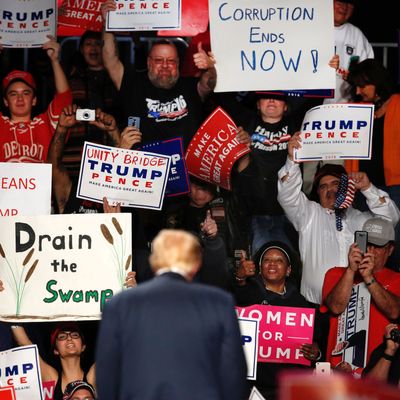
One of the ideas I tried to get across in my story for the magazine about the Trumpist transformation of the Republican Party, and that I think much of the analysis of Trump has not quite grappled with, is the reality that parties operate like herds. The focus on the individual is natural, and somewhat appropriate, given Trump’s extraordinarily disqualifying combination of personal traits. Still, all of Trump’s personal and ideological tics can be connected to decades-long trends within the Republican Party toward anti-intellectualism, white racial paranoia, and authoritarianism.
The herd quality of parties explains why the most pessimistic observers of the Republican Party during the Obama era have been right — indeed, Trump’s rise has proven many of us to have been insufficiently pessimistic about the party — and the optimists wrong. The optimists have believed that the GOP could elide, or move beyond, its most fanatical and retrograde elements with some kind of killer app: Just the right kind of presidential candidate, or Speaker of the House, or domestic-policy innovation, could reposition Republicans as a serious, responsible governing force.
But it hasn’t worked because the outliers in the party have a way of pulling the herd in their direction. The party’s position will tend to reflect a congenial midpoint, or at least a lowest common denominator, that is acceptable to all its factions. So, given that a large segment of the Republican Party believes Barack Obama is a secret Muslim, a noncitizen, and plotting to undermine the United States intentionally, the party leadership is in no position to denounce these beliefs. Instead it will co-opt them. Republican leaders like John Boehner and Eric Cantor are not birthers, but they could not come out and call birtherism a nutty conspiracy theory. Instead, they elided the issue. The most extreme voices within the party don’t always, or even usually, win, but they have to be accommodated and treated with some respect. Say, a Mitt Romney might pull off the 2012 primary, but he’d need to accept the public endorsement of prominent birther Donald Trump.
Consider another example. Today’s Wall Street Journal editorial page regularly publishes pseudoscientific screeds about climate change by kooks. Today’s has an op-ed making the case that carbon-dioxide emissions are really good for the planet. Unlike many climate deniers published in the Journal and other right-wing organs, today’s version does not deny that carbon-dioxide emissions trap heat in the atmosphere. Instead, the authors argue it causes a “benefit to agriculture.” Here in America, they note, “In 2013 the level of U.S. farm output was about 2.7 times its 1948 level, and productivity was growing at an average annual rate of 1.52%.” You don’t need to know much about science or agriculture to realize that farms have grown more productive for reasons unrelated to the higher levels of carbon dioxide in the atmosphere. Or that scientific authorities agree that rising CO2 levels will have a dire, immensely costly impact on the climate.
Why does this matter? It’s not that this op-ed will compel Republican elected officials to embrace the theory that CO2 is harmless. Indeed, Republican candidates have been slowly edging away from outright science denial and toward other rationalizations for permitting unlimited greenhouse-gas emissions. The point is that the kooks are an important part of the herd. They have a voice in the room. And there’s simply no possible chance the Republican Party can even begin to craft a sane policy toward greenhouse-gas emissions if they need to satisfy a large contingent of science-doubting kooks.
Trump is certainly an outlier within the party. Republicans have never before nominated such a grotesquely ignorant and transparently dangerous figure for president, and may never again. But a party is defined by the bounds of what it considers acceptable. The contemporary GOP could not nominate a candidate who has a plan to raise the effective tax rate on the highest-earning one percent of taxpayers, but it could nominate one who thinks Antonin Scalia was murdered.
Parties evolve slowly and over a long period of time. The Democratic Party started moving left on civil rights during the New Deal, but, as late as 1960, Robert Kennedy was mollifying fellow Democrats who found even a symbolic outreach to Martin Luther King Jr. utterly outrageous:
The alliance between Democrats and the white South is an unusual case. The party was torn between wings with utterly irreconcilable agendas. It couldn’t contain Strom Thurmond and Martin Luther King forever, and it didn’t. Yet it took decades, and transformative federal civil rights and voting-rights legislation to sever a part of the party’s constituency. And even then, vestigial loyalties at the state and local level persisted so long that Alabama’s state legislature remained Democratic until the 2010 elections.
And if you think even that extraordinary, elongated split provides a model for the GOP and Trumpism, keep in mind that the white racial conservatives who fled the Democratic Party had somewhere to go where they could have influence in the two-party system. The Trumpists do not. The Republican Party has absorbed Trump and his supporters, including his white nationalist backers. The dynamic that brought them together was set in motion decades ago. The notion that it will spit them out, or reorient itself in some fundamental way, is hopelessly unrealistic in the near term. Trump himself may or may not disappear, but the party he now leads will continue its long historical trajectory with or without him. The morning after the election will not be a cold dawn for the Republican Party. It will not even be midnight.






























